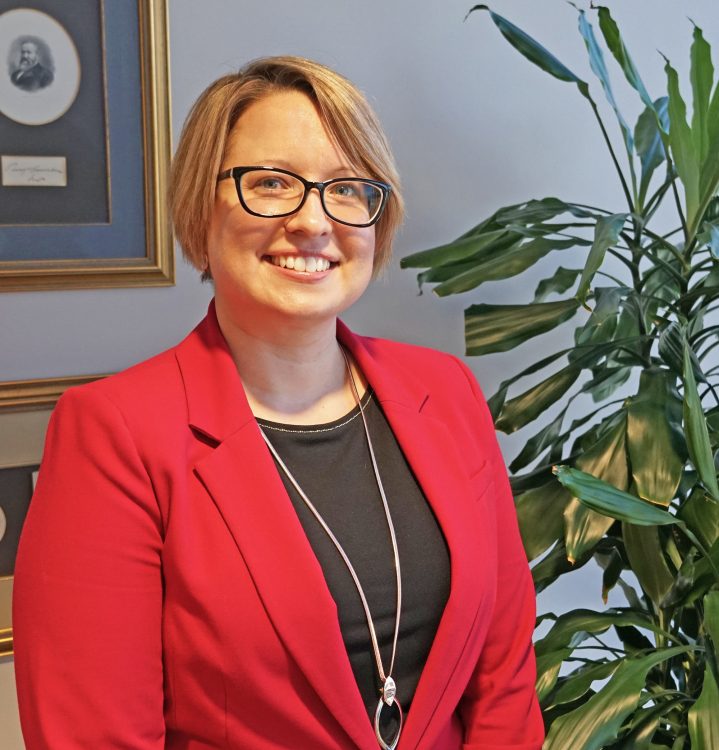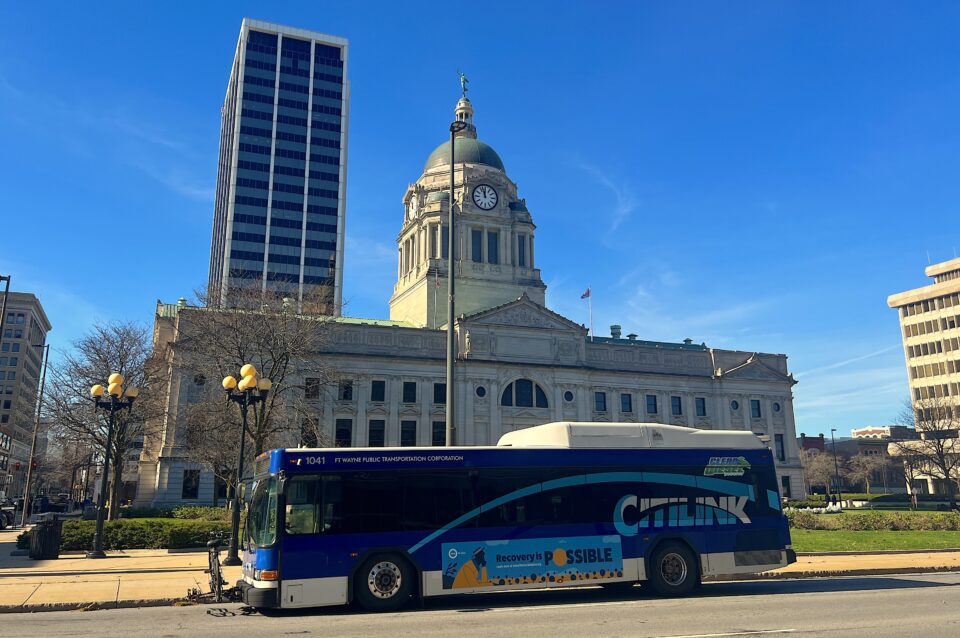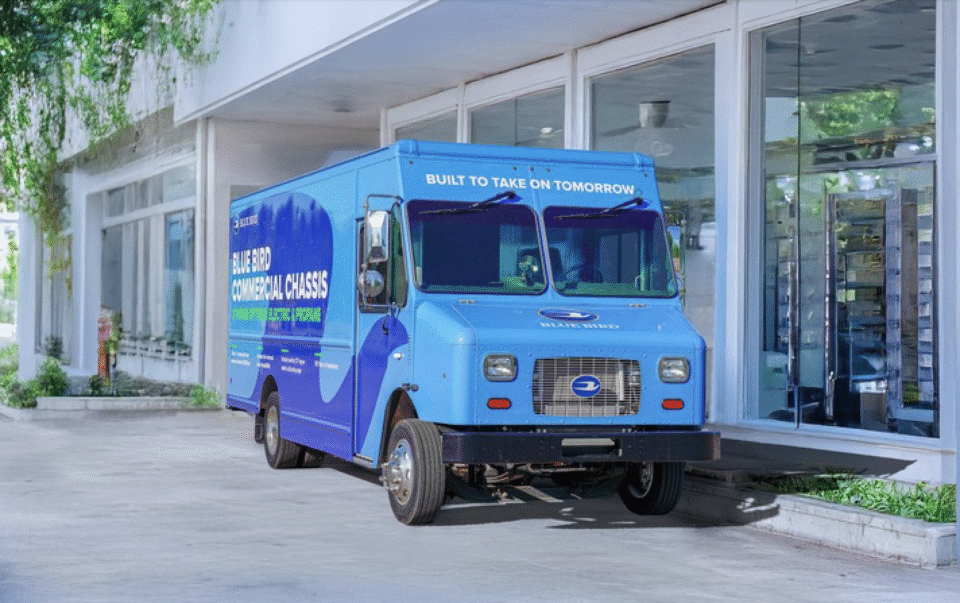Indiana Soybean Alliance and Indiana Corn Marketing Council find a successful relationship in Greater Indiana

The promotion of alternative fuels in Indiana is strong, thanks to a growing relationship between Greater Indiana Clean Cities and the Indiana Soybean Alliance and the Indiana Corn Marketing Council. Helena Jette is the Biofuels Director for the Indiana Soybean Alliance and the Indiana Corn Marketing Council, both of which are Champion Members of the Greater Indiana Clean Cities Coalition. Helena is a board member for Greater Indiana (GICCC) and makes sure the needs of Indiana corn and soybean farmers are being represented.
“Not growing up in an agricultural family, this whole experience over the last two years has been incredibly eye-opening,” Jette said. “The Indiana Soybean Alliance and the Indiana Corn Marketing Council are awesome organizations that speak for the farmers that need a voice to move them forward via promotion, research, marketing and education. We are unique, and there aren’t many states that have all of this under one roof that allows us to better serve the farmers.”
 Among the renewable fuel highlights for 2019, Jette said, was the U.S. Environmental Protection Agency lifting a ban on the sale of higher ethanol blends of gasoline during summer months after urging from the Trump Administration. The Indiana Corn Marketing Council said Hoosier corn growers will benefit from this change in market availability. The decision allows for the sale of gasoline blended with up to 15 percent ethanol (E15), a renewable fuel made from corn and plant materials, through the entire year – including the summer.
Among the renewable fuel highlights for 2019, Jette said, was the U.S. Environmental Protection Agency lifting a ban on the sale of higher ethanol blends of gasoline during summer months after urging from the Trump Administration. The Indiana Corn Marketing Council said Hoosier corn growers will benefit from this change in market availability. The decision allows for the sale of gasoline blended with up to 15 percent ethanol (E15), a renewable fuel made from corn and plant materials, through the entire year – including the summer.
Indiana is the fifth-largest producer of ethanol in the United States. The state’s 14 ethanol plants make an estimated 1.2 billion gallons of ethanol each year. “Year round selling of E15 (Unleaded 88) is one of the biggest steps forward for ethanol in our fuel industry,” Jette said
E15, also known as Unleaded 88, has a higher-octane rating of 88, but costs less than regular unleaded gas, safe for engines and better for the environment. This gives the average retailer a lower-priced fuel and can help attract new customers to their station and increased in-store purchasing opportunity to increase profit margins. This offers a cost-effective option at the pump for vehicles 2001 and newer.
“The importance of supporting domestic-fuel sources is to make the country energy independent,” said Jette, who emphasized that U.S. energy companies should never get too comfortable. “Why would we not want to be able to find new markets domestically for our surplus? This allows the retailer to sell E15 at the pump and the opportunity goes right back to the farmer so they can sell their corn and have a higher demand. This gives more opportunity to the farmers.”
Jette said the Indiana Soybean Alliance and the Indiana Corn Marketing Council benefit from our relationship with organizations such as Greater Indiana Clean Cities. This partnership connects farmers with the U.S. Department of Energy (DOE) and with the Clean Cities Initiatives.

“Having Greater Indiana attend our events and connect others to opportunities provided through the Clean Cities programs is incredibly valuable,” Jette explained. “My programs are geared toward a better environment and supporting our Indiana farming communities. Having Greater Indiana involved in the programs is really positive. Kerri Garvin, Executive Director of Greater Indiana Clean Cities, recently attended the announcement and spoke in support for the Soy-Based Motor Oil by Biosynthetic Technologies. Their involvement strengthens our bond and lends support to our mission. We look forward to seeing Greater Indiana at the High Octane Fuel Summit on May 14, 2020 and continuing our work together in the new decade.”
Garvin stated, “It is our role as a Clean Cities Coalition serving Indiana to help promote, support and assist our stakeholders with their missions, building more awareness and investment in alternative fuel transportation. The use of domestically sourced fuels promotes our economy that allow you to fuel your vehicles and support our neighbors at the same time.”
As Clean Cities Initiatives enters 2020, partnerships with organizations like the Indiana Soybean Alliance and Indiana Corn Marketing Council and Greater Indiana Clean Cities Coalition will become more important. As investment in alternative fuels and energy efficiency becomes more crucial to a successful future in Indiana, the roles of these partnerships come front and center. Representation for Indiana farmers through opportunities like E15 are going to allow our communities to prosper while creating lasting change for alternative fuel needs in the days ahead.
For more details or grant opportunities, contact Jette at 317-644-2849 or hjette@indianasoybean.com
For more information about Greater Indiana Clean Cities Coalition, visit GreaterIndiana.com or contact Kerri Garvin at kerri@greaterindiana.com
Want to know why 2020 is the year of biodiesel? Click here.
by Stephen J. Bailey for Greater Indiana Clean Cities Coalition
View the original article




